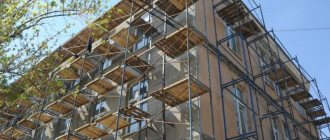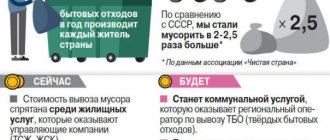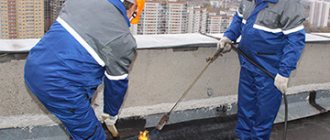Unfortunately, all attempts to overturn the decision to introduce fees for major home repairs through the highest courts were unsuccessful: in 2021, the Constitutional Court of the Russian Federation recognized the legality of this measure (resolution No. 10-P dated April 12, 2016).
And yet, the law allows in some cases to be exempt from paying contributions for major repairs not only partially, but also completely.
Let's consider who this year can take advantage of benefits for a partial reduction in contributions for major repairs, and who can not pay for it at all.
Why are they collecting money for major repairs?
Since 2013, residents of the Russian Federation have received new payment receipts for major repairs in high-rise buildings. In 2012, amendments and additions were made to the Housing Code of the Russian Federation stating that ensuring the repair of multi-storey buildings falls entirely on the owners. Over the next 2 years, contributions began to be introduced in different regions of the country.
In megacities and towns, the established tariffs and timing of repairs differ. Since most residential buildings in the Russian Federation were built more than ten years ago, money from contributions goes to improve living conditions and home safety. Renovation of apartment buildings requires significant investments, so it was decided that contributions would accumulate gradually.
Major repairs require restoration of characteristics according to standards, therefore the program includes:
- Replacement of building structures in whole or in parts.
- Strengthening and repairing balconies.
- Strengthening the foundation.
- Replacing elevators.
- Roof repair.
- Insulation of the facade if necessary.
Non-profit regional funds are engaged in accumulating repair contributions. The first in line for major repairs are the oldest, most worn-out buildings. Renovations on newer homes are being delayed until 2030. On the “housing and communal services reform” website you can find out when the turn of a particular house will come, how much money has already been collected for its repairs and how much remains to be saved.
Major repairs of new apartment buildings up to 5 years
There is such a thing as wear and tear. It would be a mistake to think that if the house is new, then it is too early to think about major repairs.
For example, the service life of an elevator is 25 years. Facade cladding, hot and cold water supply systems - already 10-15. But a seam roof and a soft roof with a bitumen layer will have to be replaced after just 5 years.
That is, after 15-20 years, most structures will become unusable. And to replace them, a significant amount will be needed. Therefore, the sooner the owners start saving money, the easier and better the repairs will be.
If tenants still do not want to pay the fees, then they violate the obligations imposed by Article 168 of the Housing Code.
Do I need to pay for major repairs in a new house, fees?
The first thing owners of apartments in a new building need to do is choose the form of management of the apartment building - a management company or a homeowners' association.
Next, they determine the method of forming the Fund. There are 3 options:
- Shared account with a regional operator.
- A special account with a regional operator.
- Special account for HOAs, management companies, housing cooperatives.
Each method has its own advantages and disadvantages. Therefore, this issue must be considered in detail. For example, if the condition of the house is close to emergency, then it is better to choose a general account with a regional operator. Because then the money is allocated to repair houses that need it first.
The special account allows for greater flexibility of funds. Residents can save money and manage it. They have the right, having saved a sufficient amount, for example, to use it to replace the heating system. Next time, cover the roof. But the owners also have a great responsibility.
After all these organizational measures, the house will be included in the regional capital repair program. The program is updated annually. According to Article 168 of the Housing Code, it does not include houses with more than 70% deterioration or if the amount of major repairs exceeds the limit in the region. Such houses are recognized as unsafe, or the issue of reconstruction is being considered.
But if the house has not yet been included in the capital repair program, and payment is already being collected, this is illegal. You need to complain to the local administration, police, prosecutor's office.
For owners of apartments in new buildings, Article 170 of the Housing Code provides for deferred payments. That is, the house is included in the program, and contributions begin to be paid after some time. Maximum – 5 years.
Each region has its own deferment period . The hardest thing is for Muscovites - there is no deferment for them, just like for St. Petersburg residents. Both in Moscow and St. Petersburg, fees for major repairs in new buildings are charged completely legally, no deferment is provided. In the Tyumen region - 4 months. And in Samara and Novosibirsk the maximum period is 5 years.
How old does a house have to be to pay for major repairs?
As we can see from the text above, a lot depends on the region of your residence. But there are also “loopholes” that will help you defend your rights even in the capital.
What to do if in the region the deferment is accepted, for example, 1 year, but the house is under warranty from the developer for 5 years. After all, if a third party intervenes in the building structures or engineering systems of the building, the warranty will be void.
Then the owners have the right to write an application for deferment. All owners of apartment buildings must vote for this at a general meeting of residents.
The application is written to the regional administration. It provides arguments why owners are asking to defer contributions for major repairs.
The housing commission evaluates the condition of the house and makes a decision. If the answer is no, then payment begins.
Please note that deferment of payments for major repairs is only possible if the house was put into operation no more than 5 years ago.
Who is obliged to pay
The main category of persons who are required to pay contributions for major repairs by region are the owners of rooms and apartments in an apartment building. Such objects include houses with more than 3 apartments. Payment of fees applies to all owners - even legal entities. Moreover, it does not matter whether they have a living space or not. The municipality pays for apartments that are municipally owned. Even the state is forced to pay fees for premises that are state-owned.
If the owner has accumulated debts on contributions, then the obligation to pay them is transferred to the new owner. Only those people who own houses can avoid paying contributions:
- designated as unsafe and subject to demolition;
- withdrawn from the housing stock for the needs of the municipality and the state.
Those persons who rent an apartment or room do not pay money for the renovation of the building. This is the direct responsibility of the owner.
The amount of contributions is set locally by the constituent entities of the Russian Federation. In this case, a minimum monthly amount is assigned. But building residents have the right to independently request an increase in payment if they need additional services or want to make repairs faster.
What happens if you don't pay
If a citizen is not a beneficiary, he has to pay the appropriate fee in full. Despite the desire, you should not ignore this payment, as a debt will form, which, sooner or later, will still have to be repaid. Not only that, as mentioned above, beneficiaries also pay for repairs. But then they will get their money back by transferring it to their personal account. If they do not make the appropriate payments for at least two months, the subsidies are suspended and the debtor is notified of the period during which the money must be paid. If payment is made, the benefit continues to apply.
For other citizens, the following situation occurs. For the resulting debt, a penalty is charged, the amount of which is 1/300 of the refinancing rate of the Central Bank of the Russian Federation for the overdue day (as stated in Article 255 of the Housing Code of the Russian Federation). If a significant amount of debt accumulates, the organization that is involved in the formation of this account has the right to apply to the court with a statement of claim to collect the debt. Then deductions will be carried out by bailiffs, on the basis of a writ of execution (and for this they are endowed with many tools).
Some citizens believe that after repair work has been carried out on the house, there is no longer a need to pay the corresponding fee. But in practice this is not the case. Often, credit funds are used to carry out these works, and repairs are done on credit. Therefore, the obligation to pay remains even if the house is renovated. But if the residents have completed the main repairs themselves, then it is possible to cancel this payment for a certain period or at least reduce it.
Beneficiaries
Tenants and residents of buildings subject to demolition or transferred to the state do not pay contributions, although they are not classified as beneficiaries.
The preferential categories that have the right to receive compensation or not pay contributions for major repairs by region include the following owners:
- Large families.
- Non-working pensioners under 70 years of age. They are compensated for 50% of their contributions, and pensioners aged 80 years and older receive a full refund of the funds spent.
- Disabled people of groups 1 and 2 and families raising a disabled child.
- WWII veterans.
- Persons who have been exposed to radiation.
- Low-income families. In this case, payments are included in utilities when calculating subsidies.
- Labor veterans.
- Victims of repression who were rehabilitated.
But exemption from payment of money and compensation of contributions are not the same thing. Those who are exempt from fees do not pay them. Beneficiaries must make a payment, but later the state returns them the full amount or part of it.
Conclusion
Major repairs must be paid every month. Even those who are exempt (fully or partially) from paying for major repairs must make this payment. But he gets his money back. If residents who are not beneficiaries ignore the corresponding expense column, a penalty will be charged. Therefore, they will have to pay even more later.
In some cases, the law allows for the possibility of not making this payment. Then we are not talking about specific citizens who are beneficiaries. This expense item may be absent, for example, due to a building that is in disrepair, or the land under the house being seized for the needs of the state or municipality.
How to get compensation
To apply for compensation of funds from contributions for major repairs, visit the state administration with the following package of documents:
- application form - the staff will tell you how to write it;
- citizenship of the owner of the property and other people who live in it;
- a document that indicates the right to benefits - a pension or benefit certificate;
- receipts that confirm payments for major repairs;
- a document confirming the number of family members;
- certificate of absence of debts for payment of housing and communal services for the previous period.
You can also submit these documents to the MFC or on the State Services portal.
Step-by-step instructions for paying through Sberbank Online
Sequence of actions when paying on the Sberbank website:
- Log in to your personal account using your ID and password with confirmation via SMS code.
- In the “Payments and Transfers” section, select “Payment for purchases and services”.
- Next - “Housing and communal services and home telephone” - “Rent”.
- On the next page, select the “Capital Repair Fund” link.
- In the drop-down menu in the first window, select a service (this is usually the region where the apartment building is located), then - the write-off card, in the third line - the payer’s personal account.
- The system will redirect you to the payment page, where all the details of the recipient and payer are already indicated. You need to carefully check all the information and only then enter the amount and click the “Continue” button.
For security, the operation is always confirmed with a code from SMS or from the list of one-time passwords. If everything is done correctly, the “Completed” status will appear. It is recommended to print and save the receipt on this same page. And for convenience, save the form as a template so that next time the process happens even faster.
Consequences of non-payment
The Housing Code of the Russian Federation states that homeowners are required to pay contributions for major repairs of the building. Article 155 of the RF Housing Code establishes fines for debtors: a penalty of 0.025% of the total debt for each overdue day.
Contributions for major repairs are classified as utility services, therefore, in case of non-payment, they resort to various measures of influence on the debtor:
- litigation;
- arrest;
- seizure of property;
- ban on leaving the Russian Federation.
In 2021, according to statistics, an average of 90% of citizens in the country pay the contribution money. But for each individual region the indicators are different: in Crimea, 44% of owners pay money, and in Perm - more than 100%. This result was achieved due to the fact that citizens pay not only current contributions, but also accumulated debts on payments for major repairs.
The Supreme Court of the Russian Federation confirmed the legality of collecting funds for repairs, taking into account current legislation. Therefore, in almost all situations, the court supports the fund to collect money, and not the citizens who refuse to pay.
Explanation of the tariff for “maintenance and current repairs of common property”
Receipts for housing and communal services indicate fees not only for major repairs, but also for current ones. What is the breakdown of this payment?
It is necessary to distinguish between 2 types of repairs - major and current.
Current repairs and maintenance of the common property of the apartment building include:
- preparation for the heating season;
- minor and cosmetic repairs (such as painting the walls of the entrance);
- preventive measures to support the performance of engineering systems;
- emergency work;
- sanitation;
- landscaping.
For example, if a window in the entrance is broken, it will be replaced as part of ongoing repairs. And with a major renovation, new windows will be installed in all entrances. During current repairs, they will replace the broken step, and change the floor during major repairs.
It should be noted that for the normal functioning of all systems, both types of work are required.
Is there an alternative
There are no other payment options for major repairs. But, if a citizen has reasons not to trust the fund, he can use an alternative method of saving money:
| Type of accumulation | Peculiarity |
| Fund operator account by region | The regional operator transfers funds under the program. It is used to identify houses based on their condition and set the amount of fees. This method is installed for those buildings that are already close to emergency conditions. |
| Special account for house residents | The money is kept in the account until repairs are carried out. Residents independently decide what to spend the accumulated funds on. They can negotiate a higher rate for faster repairs or for additional general house needs. |
If residents did not vote on the payment method or there were more votes for the first option, then homeowners pay the receipts and deposit funds into the operator’s account. If the majority of owners have chosen a special account, then residents are approved for this method of making payments. At the same time, residents also receive receipts, they pay for them, but the money is sent to their special account.
To accumulate funds for major repairs, an account is opened in a bank. The owners decide among themselves on what purposes to spend the money. After completing the work, the bank, by order of authorized persons, transfers funds for settlement with the team of workers and with suppliers of building materials.
Other payment methods for major repairs for Sberbank clients
- Through . You can connect it at a terminal, ATM or in your personal account. Payment for major repairs will occur on time and automatically. To control payments, Sberbank will send notifications to the client’s phone.
- According to a receipt received from the regional overhaul operator. You can pay at additional Sberbank offices, at the post office or at unified payment centers.
- Via an ATM or terminal. Insert the card into the device, select on the monitor the item “Payments in your region” - “Next” - “Payment. After this, enter the payer code from the receipt, the date and amount of the contribution. Click on the “Pay” button. When paying from the terminal, you can use the “Cash Payments” function. In order not to enter all the details, you can attach the barcode to the reader on the terminal.
- On the website of the Capital Repair Fund. In this case, you need to register a client’s personal account.
- At the payment acceptance points indicated on the receipt.
The need to pay for major repairs to residents of new buildings
Article 170 of the Housing Code of the Russian Federation, paragraph 5.1, establishes the procedure for paying funds for major repairs for residents of new buildings. According to this clause, owners of apartments in houses built after the advent of the program for payments for major repairs begin to make contributions only after a certain period.
For a maximum of 5 years, the building is under the developer's guarantee, and he must carry out repair work. But this period is determined individually for each building in different regions. Typically this period is only 12 months. After the warranty period expires, owners begin to receive receipts for payment for major repairs.
Is it legal?
Despite the changes that have been made regarding the lack of payments in the first years after the delivery of the house, some management organizations continue to charge these payments in new buildings .
Many organizations responsible for the repair and maintenance of the house thus form a so-called “control cushion” in case the period allotted by the legislation of the subject expires, and a breakdown occurs in the house - immediately stand in line for major repairs.
But many collect these payments illegally , thereby lining their pockets. Unscrupulous management organizations often do this.
Only the legislation of the subject may allow the collection of payments ahead of schedule in connection with special cases, for example, if it turns out that the new house has a major defect.
also collect payments from the owners themselves before the deadline expires . This is done in order to form a utility repair fund as early as possible in case of unforeseen breakdowns (we talked about the formation of the fund here).
Minimum payment for major repairs
In each region, the cost of contributions per 1 square meter is set independently, but the law provides for the possibility of raising prices. House residents can vote for a higher rate to get renovations started faster or to include additional features.
On average, contributions for major repairs by region per 1 sq. m is 6 rubles. But in Moscow the price for 1 meter is set at 15 rubles. In other cities, prices are often set too low - up to 3 rubles. This approach leads to the accumulation of a very small amount each year, which is enough to repair only a few houses. Therefore, many buildings can wait decades for their turn.
about the author
Klavdiya Treskova - higher education with qualification “Economist”, with specializations “Economics and Management” and “Computer Technologies” at PSU. She worked in a bank in positions from operator to acting. Head of the Department for servicing private and corporate clients. Every year she successfully passed certifications, education and training in banking services. Total work experience in the bank is more than 15 years. [email protected]
Is this article useful? Not really
Help us find out how much this article helped you. If something is missing or the information is not accurate, please report it below in the comments or write to us by email
How to pay for major repairs in a new house
No less than 3 months before the start of payments, the owners at a general meeting decide on the method of forming the FCR (options were described above). Other organizational issues are also addressed:
- amount of contributions;
- fund size;
- list of priority and secondary works.
Subjects of the Russian Federation set their own minimum tariffs . Then the total number of apartment buildings, their technical condition, the relationship with utility bills, and the degree of state support are taken into account.
In Moscow in 2021, a tariff of 18.19 rubles per square meter has been established. In Yekaterinburg – 9.36 rubles. And in the Republic of Mari El – only 5.20.
But owners can increase the monthly payment, for example, when saving for a certain type of work.
Comments: 1
Your comment (question) If you have questions about this article, you can tell us. Our team consists of only experienced experts and specialists with specialized education. We will try to help you in this topic:
Author of the article: Klavdiya Treskova
Consultant, author Popovich Anna
Financial author Olga Pikhotskaya
- not Pavel Alekseevich
08/13/2021 at 07:11 why is the basic law/constitution of the Russian Federation/ unable to protect its citizens from the feudal lords in power?
Reply ↓
Common boiler
In the region, a program for the overhaul of the housing stock is created and agreed upon, a trust account is opened where funds are accumulated, and payment for major repairs is determined. Next, all work on major repairs of each house included in the program is carried out sequentially.
This procedure does not guarantee the allocation of collected funds upon request; it determines the priority of multi-apartment buildings. Everyone is waiting for the approved order of their house.
ATTENTION! Monitor the progress of the work and write all complaints to the public reception register.
The territorial program must be published in official media sources of the constituent entity of the Russian Federation or on public websites of local authorities and can be read by anyone who needs it.
The supervisory function over the legality of the distribution of collected monetary resources from the “common pot” is assigned to the state housing inspection. You need to be prepared that repairs will have to wait for several years. If necessary, you will have to start repairs using your own funds, and the accumulated funds will depreciate.
Based on this, your own account at home is more profitable. Also, the law does not prohibit collecting a larger amount than determined by the authorities.
The cost of major repairs is calculated based on the current condition of the common property and depends on the service life of the most important elements. In the case when the repair costs are too high and the apartment owners are unable to raise such an amount on their own, a common boiler is more attractive.
Sometimes apartment owners, contributing funds to the common pot, approve at a general meeting the decision to create an additional account for their own home.
Types of jobs
The law clearly defines the list of works performed with these funds:
- restoration of the functional elevator system or complete replacement of such equipment that has exhausted its service life;
- establishing the functionality of engineering communications, replacing water and sewer pipes, electricians, eliminating breakdowns and defects in gas supply systems and others;
- replacement of roofing material, as well as ventilation, drainage or drainage systems;
- carrying out work aimed at restoring the facade of the building;
- strengthening the foundation of the building and foundation work;
- bringing the attic and basement rooms into proper technical condition;
- installation of communal heating meters to optimize utility costs.
The list of works can be expanded, depending on the specific building.
How long does it take to pay fees?
The legislation does not provide for time limits on contributions. You must pay monthly no less than the minimum established amount, regardless of whether repairs have already been carried out in the house, whether repair work is required (whether the regional program provides for) for future periods, etc.
True, for houses in which the capital repair fund is accumulated in a special account of the HOA, management company, housing complex (not by a regional operator), upon reaching the minimum level of the fund size for an individual house (this amount is established by the laws of the constituent entity of the Russian Federation), payments can be suspended by decision of the home owners.
How to find out when repairs will take place
On the website of the registrar, as well as in the state information system of housing and communal services, there is detailed information about each house in the region, territory, republic, which is included in the regional overhaul program. If your house is included in the program, information will be available on the repair period (within three years), on the types of work performed and other data. In addition, at least six months before the renovation, the regional fund warns about the event and informs the owners of the apartment buildings about the estimated cost, scope of work, etc. The owners discuss this at a meeting and elect an owner representative to monitor the progress and outcome of the repairs.










